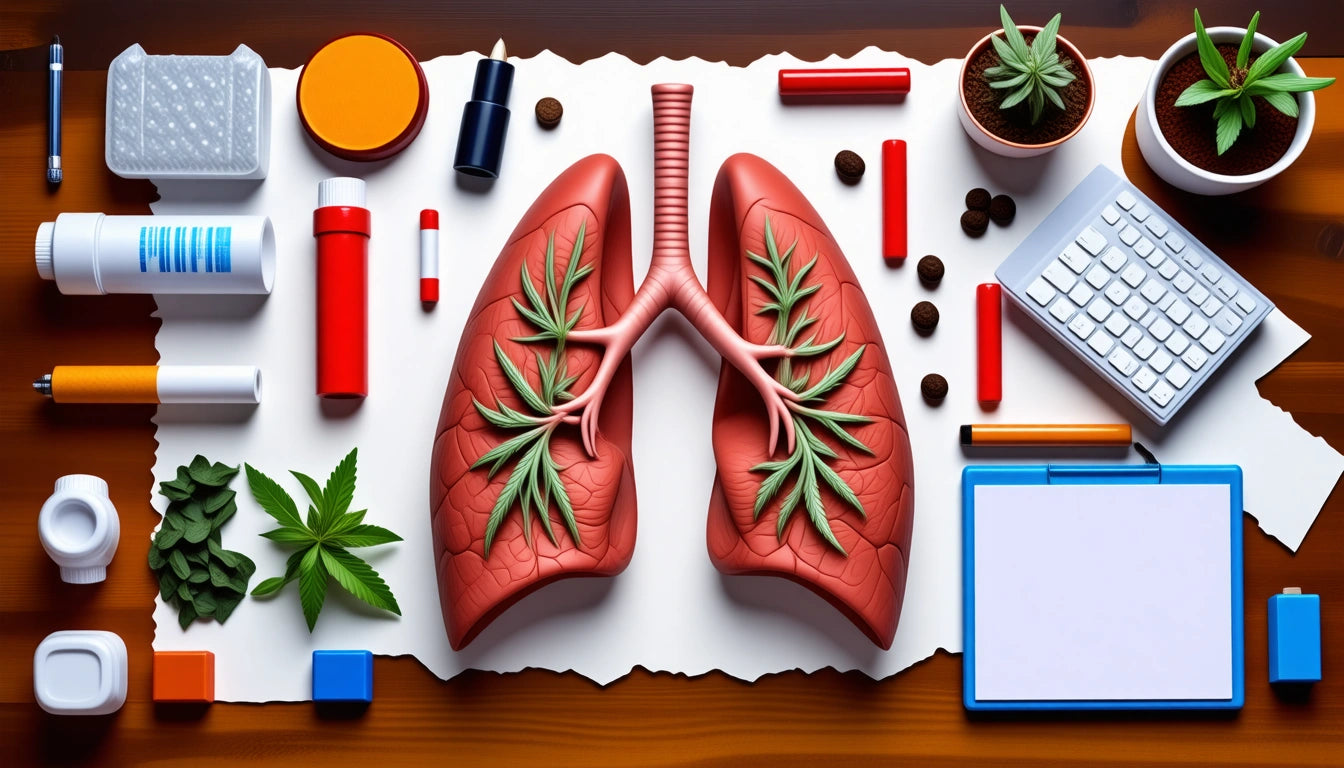Table of Contents
The Impact of Cannabis on Lung Health: Separating Fact from Fiction
The question "does smoking weed damage your lungs?" remains a common concern among both recreational and medical cannabis users. With increasing legalization and normalization of cannabis use, understanding the potential respiratory impacts has become increasingly important. This article examines the scientific evidence surrounding cannabis and lung health, comparing it with tobacco effects while exploring safer consumption alternatives.
Cannabis Smoke vs. Tobacco: Understanding the Differences
When comparing whether smoking weed or cigarettes is worse for lungs, it's important to understand their fundamental differences. Research comparing cannabis and tobacco smoke shows both contain harmful compounds, but with important distinctions:
- Cannabis smoke contains many of the same carcinogens as tobacco smoke
- Cannabis is typically smoked without filters, potentially allowing more tar to enter the lungs
- Cannabis users generally smoke less material by volume than tobacco users
- Cannabis contains cannabinoids which may have anti-inflammatory properties that partially counteract damage
The inhalation patterns differ significantly as well. Cannabis smokers typically inhale more deeply and hold smoke longer in the lungs, potentially exposing lung tissue to more tar per puff. However, the average cannabis user consumes far fewer "cigarettes" per day than the average tobacco smoker.
Short-Term Effects of Cannabis on Lung Health
Immediate Respiratory Responses
For many users wondering "does weed affect your lungs" in the short term, the answer is yes. Immediate effects can include:
- Bronchodilation (opening of airways) initially
- Coughing during and after smoking sessions
- Increased phlegm production
- Throat irritation and potential wheezing
These acute effects are largely related to the heat and irritants in the smoke rather than cannabinoids themselves. Cannabis use and bronchitis have a documented connection, with regular smokers reporting more frequent symptoms of chronic bronchitis.
Infection Risk
Some research suggests smoking cannabis may temporarily suppress certain immune functions in the respiratory system. This has prompted questions like "can smoking weed cause pneumonia?" While direct causation isn't firmly established, heavy cannabis smoking may increase susceptibility to respiratory infections in some individuals.
Long-Term Concerns and Research Findings
The question "does weed damage lungs" over the long term has more nuanced answers. Current research points to several potential concerns:
Chronic Bronchitis
Regular cannabis smoking is associated with symptoms of chronic bronchitis, including chronic cough, increased phlegm production, and wheezing. These symptoms typically improve after cessation of smoking.
Lung Cancer Risk
Despite theoretical concerns, research on cannabis and lung cancer risk has not demonstrated a strong causal relationship. Several large-scale studies have failed to find a significant association between cannabis-only smoking and lung cancer after controlling for tobacco use, though research continues.
Lung Function
Interestingly, studies examining "how does smoking weed affect your lungs" regarding function have produced mixed results. Some research suggests occasional cannabis smoking may be associated with increased lung capacity, potentially due to the deep inhalation technique. However, heavy, long-term use appears to be associated with some decline in lung function.
Alternative Consumption Methods and Lung Health
For those concerned about whether weed hurts lungs, alternative consumption methods offer potential harm reduction:
Vaporization
Vaporizing heats cannabis to temperatures that release cannabinoids without burning plant material, reducing harmful byproducts. However, questions like "does vaping cannabis hurt lungs" remain partially unanswered due to limited long-term research. Low-quality vape products may present their own risks.
For those interested in reducing combustion-related risks, using quality equipment is essential. Quality grinder machines for cannabis preparation can help ensure more even heating and potentially reduce the temperature needed for effective vaporization.
Edibles and Tinctures
Many users ask "do edibles affect your lungs?" The simple answer is no. Edibles bypass the respiratory system entirely, eliminating smoking-related lung concerns. However, they present different considerations regarding onset time, duration, and intensity of effects.
Harm Reduction Strategies for Cannabis Users
For those who prefer smoking but are concerned about "how bad is weed for your lungs," several harm reduction strategies may help minimize respiratory risks:
- Using lower temperatures when possible
- Avoiding holding smoke in the lungs for extended periods
- Using water filtration devices that may remove some particulates
- Taking breaks from smoking to allow respiratory recovery
- Considering microdosing approaches that reduce overall smoke exposure
Understanding how cannabis affects lung health allows users to make informed decisions about consumption methods and frequency.
Evidence-Based Perspective on Cannabis and Respiratory Health
When examining whether cannabis damages lungs, context matters significantly. Current evidence suggests:
- Occasional, moderate cannabis smoking appears to pose relatively minor risks to lung health in otherwise healthy adults
- Heavy, long-term smoking may contribute to chronic bronchitis and potentially other respiratory issues
- The risk profile differs significantly from tobacco, with less evidence for connections to fatal lung diseases
- Individual factors including pre-existing conditions, age, and concurrent tobacco use significantly affect risk levels
For those with existing respiratory conditions or concerns about whether weed affects lungs negatively, consulting healthcare providers and considering non-inhalation methods represents the safest approach. As research continues to evolve, our understanding of the long-term impacts of different consumption methods will likely become more refined.











Leave a comment
All comments are moderated before being published.
This site is protected by hCaptcha and the hCaptcha Privacy Policy and Terms of Service apply.